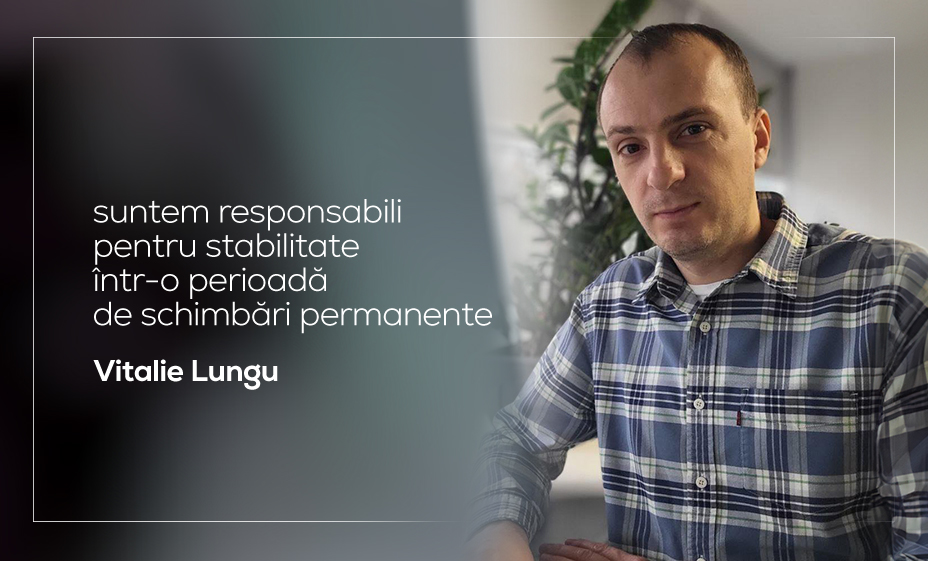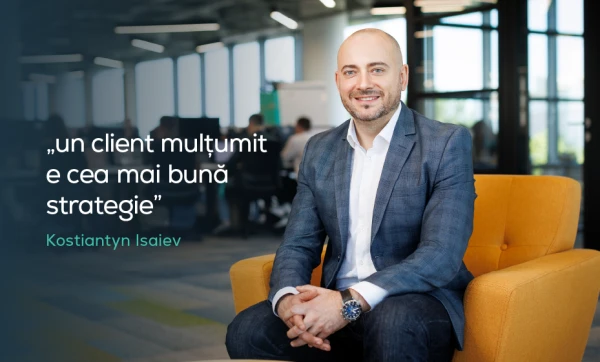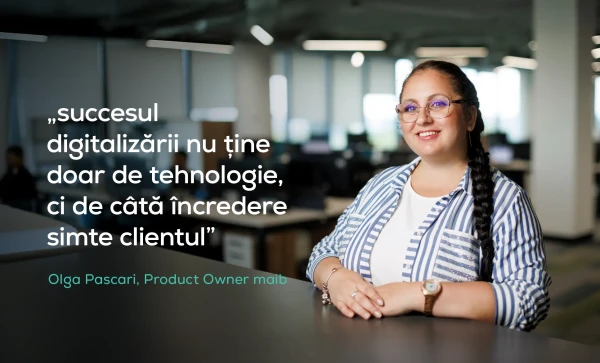Vitalie Lungu, Head of Issuing, Processing and Payments, Cards Department, within maib, told Pavel Zingan in an interview about the cards sector, the behind-the-scenes of card operations and what the sector's future looks like. Discover in the interview the professional passion of one of maib people.
Hello Vitalie. To be precise. Are you responsible for the technology part of all bank cards issued by maib?
In general, you could say that. Whether this card will generate cashback or offer instalment payments is a decision by the bank's marketing and product teams. Our task is to provide technological and operational support for all these processes.
So even the aspect of making them run smoothly 24/7/365 is the preserve of your business?
Exactly.
Given this is a dynamic system, with new modules and versions being added constantly, I can imagine how much responsibility and tension prevails in your work. How long have you held this position?
I've been a maib employee since 2012, and from day one, my work has been related to cards. Initially, I worked in a branch, which helped me understand the customers. I had the experience of communicating with them. I understood how our customers see this payment instrument we offer - the card. I was so fascinated by the industry that I wanted to know what goes on behind the scenes, in the back office. Behind the scenes, things were much more complex and diverse than I imagined in the branch.
And you transferred from the branch to the back office?
Yes. I started with the card issuing processes and gradually got into the underbelly of the components of such a complex and dynamic process.
Sometimes, in interviews, when discussing complex professional topics, I ask the interviewees what message they think is important to convey to the readers. After all, not being in the field, I can easily get off topic.
First, readers should understand that behind every card as a payment tool is a whole team that makes it work. Many processes require fine-tuning. There are professional, competent people overseeing these processes. When I worked in the branch, I thought a card was just a piece of plastic you give to a customer, and that's it. But that's not the case. Many parties are involved in a transaction, such as the card-issuing bank, the processing center, international payment systems, and the merchant, possibly serviced by another bank. A transaction has many components. Our task as a team is to anticipate errors, situations or incidents to organise processes so the customer does not feel the impact. And also to ensure the correct and optimal customisation of card products and services.
How many people ensure these invisible processes in maib?
About 60 of my colleagues. Some engineers deal with ATMs, POS terminals, e-commerce, a dedicated transaction security team, a product configuration team, and a team responsible for balancing/settling card transactions. All these processes need to be controlled so that they are correct. Otherwise, unpleasant situations or losses may occur.
And no process can be stopped, right?
It is impossible to stop customer payments and tell them, for example, that for 3 days please do not use the cards. This is a continuous process. If our work seems routine for some people, it is not. The changes are constant. When I started working, most cards were magnetic stripe only. Then came chips, then contactless payments. Then came the tokenisation phase, which means using the card in a mobile app. But this has already become history. We are moving towards new technologies to make the payment process more convenient.
Would there be no more physical cards in the near or far future?
The trend is for plastic to disappear gradually. It is a worldwide process. It will likely be slower in Moldova because we have certain customer segments that don't have a device that runs tokens or other things related to social cards, salary cards, etc. But the new generations, I think, will not need plastic. We will become more environmentally friendly in our new practices.
Let's come back to the points we're highlighting in this interview...
I want to mention another point - the deadline for issuing the requested card. The customer goes to a maib branch or the maibank mobile app to apply for a card. The application comes to us, and the card is customised or configured in the system for operation. This card must reach the customer's hands as quickly as possible, whether digital or physical. That's why the speed at which we act makes all the difference regarding the customer experience.
Is there still room to reduce this time limit from application to card issuance?
We have a solution for customers who want a physical card immediately - an instant card, a physical card without the customer's name. For some people, having a name on the card is important, but in practice, all transactions can be done without the name. I believe that digital cards will also become increasingly popular. They have recently been launched in the maib portfolio, and it will be soon that customers start actively opening and authorising digital cards. The customer can open a digital card from the mobile app in just a few seconds, and is fully functional. In addition, the customer can set a PIN code via the app or block the card in case of suspected fraudulent transactions. This happens in real time, and synchronisation is immediate.
What are your team's plans for 2024?
It depends a lot on the goals set by the business lines. The business sets specific objectives, and our role is to study them and contribute with our skills to solve them. We focus on the transactional flow to organise everything precisely and correctly. We make a concerted effort to prevent errors that do not affect the customer and their experience. We will continue to focus on innovation, development of system functionality, payment systems and regulator requirements so that our internal setup is optimally configured and complies with all requirements and regulations.
Will your team be involved in open banking? Are these processes already starting in Moldova?
Indirectly, yes. This is a revolution in the organisation of payments, which will inevitably impact the card sector. The National Bank of Moldova has already set deadlines for banks to implement open banking. We are not directly involved in this project. Other divisions of the bank are involved. But we are aware of the upcoming changes in the cards sector. And we are prepared for them because one of our tasks is to ensure stability even during changes.


 maibank
maibank
 maib business app
maib business app
 online loans – legal entities
online loans – legal entities
 internet banking - individuals
internet banking - individuals
 new internet banking - maib business
new internet banking - maib business
 internet Banking - BankFlex
internet Banking - BankFlex




